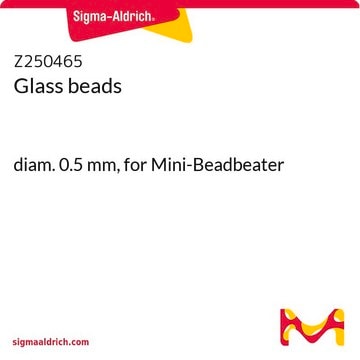G1145
Glass beads, acid-washed
150-212 μm (70-100 U.S. sieve)
Synonym(s):
Glass Beads
Sign Into View Organizational & Contract Pricing
All Photos(2)
About This Item
UNSPSC Code:
41102422
NACRES:
NB.22
Recommended Products
particle size
150-212 μm (70-100 U.S. sieve)
Application
Acid-washed glass beads have been used:
- in the lysis of yeast colonies to produce a yeast two-hybrid screen
- in the extraction of DNA from Penicillium roqueforti mycelial samples
- in disruption of Streptococcus thermophilus and Lactobacillus delbrueckii subsp. bulgaricus strains for determining the enzyme activity
Storage Class
11 - Combustible Solids
wgk_germany
nwg
flash_point_f
Not applicable
flash_point_c
Not applicable
ppe
Eyeshields, Gloves, type N95 (US)
Certificates of Analysis (COA)
Search for Certificates of Analysis (COA) by entering the products Lot/Batch Number. Lot and Batch Numbers can be found on a product’s label following the words ‘Lot’ or ‘Batch’.
Already Own This Product?
Find documentation for the products that you have recently purchased in the Document Library.
Customers Also Viewed
Dylan Dodd et al.
Nature, 551(7682), 648-652 (2017-11-24)
The human gut microbiota produces dozens of metabolites that accumulate in the bloodstream, where they can have systemic effects on the host. Although these small molecules commonly reach concentrations similar to those achieved by pharmaceutical agents, remarkably little is known
Timo Birkenstock et al.
The Journal of biological chemistry, 287(4), 2887-2895 (2011-12-07)
The desperate need for new therapeutics against notoriously antibiotic-resistant bacteria has led to a quest for novel antibacterial target structures and compounds. Moreover, defining targets and modes of action of new antimicrobial compounds remains a major challenge with standard technologies.
Kim I Sørensen et al.
Applied and environmental microbiology, 82(12), 3683-3692 (2016-04-24)
Streptococcus thermophilus and Lactobacillus delbrueckii subsp. bulgaricus are used in the fermentation of milk to produce yoghurt. These species normally metabolize only the glucose moiety of lactose, secreting galactose and producing lactic acid as the main metabolic end product. We
Amy Switzer et al.
Microbiology (Reading, England), 164(11), 1457-1470 (2018-06-30)
The initial adaptive transcriptional response to nitrogen (N) starvation in Escherichia coli involves large-scale alterations to the transcriptome mediated by the transcriptional activator, NtrC. One of these NtrC-activated genes is yeaG, which encodes a conserved bacterial kinase. Although it is
Pierre E Douarre et al.
Gut pathogens, 2(1), 11-11 (2010-09-30)
Mycobacterium avium subsp. paratuberculosis (MAP) causes a chronic gastroenteritis affecting many species. Johne's disease is one of the most widespread and economically important disease of ruminants. Since 1992 and the opening of the European market, the exposure and the transmission
Our team of scientists has experience in all areas of research including Life Science, Material Science, Chemical Synthesis, Chromatography, Analytical and many others.
Contact Technical Service












